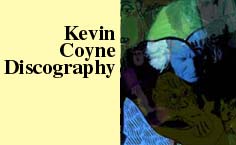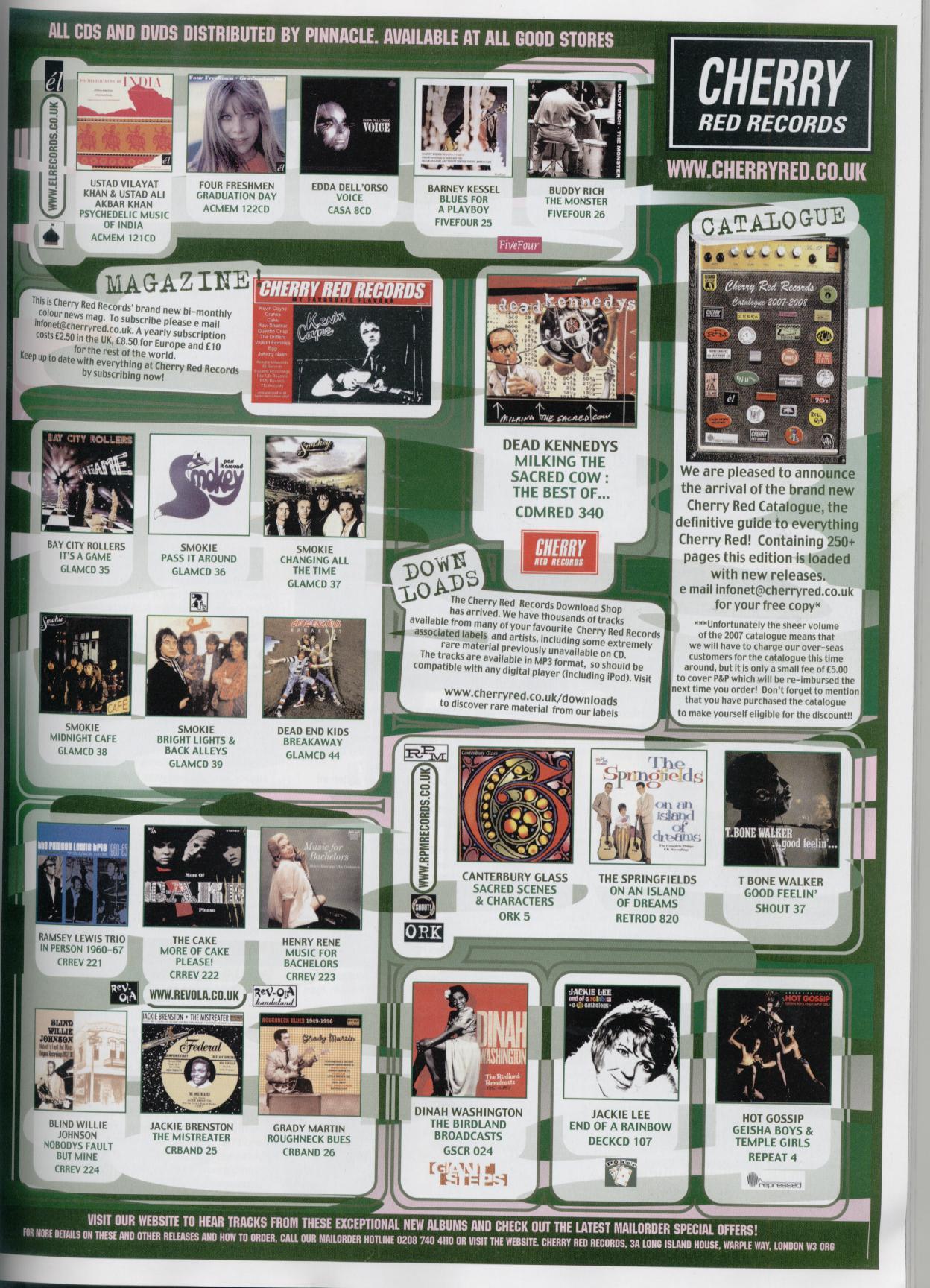
PASCAL's
KEVIN COYNE HOME PAGE 
Press about the Kevin Coyne (with Siren) – The DandelionYears 1969-1972 Cherry Red 3CD box:
Kevin Coyne's Dandelion Years
by Jason Gross, Anthology Recordings
How was it that an odd, scraggly singer found boosters in the form of influential DJ/figurehead John Peel and label mogul Richard Branson (who each signed him to their labels) and the Doors' management who considered him to replace Jim Morrison in the band? Such is the unique appeal of the late Kevin Coyne, whose early formative years are heard in the Dandelion Years collection.
The English Midlands city called Derby is known as a birthplace of the Industrial Revolution where mills sprang up and also spawned the likes of everyone from nursing pioneer Florence Nightingale to the Rolls Royce Corporation and in 1944, a future art-school student and budding singer. The young Mr. Coyne was a rock and roll fan, joining up with a group called the Vultures in his wee teens. But that got side-lined for a while so he could indulge in another passion. While art-school was the breeding place for an important generation of 60's musicians, Coyne didn't use it for a practice space for a band but to actually indulge in drawing, a calling that he'd always carry with him.
In the mid-60’s, he switched gears again, returning to music. Joining up with pianist/guitarist Nick Cudworth and bassist Dave Clague, the trio formed the core of Siren, with a revolving set of musicians, including a forgotten bus conducter who played drums on their demo. Though the band played out infrequently, Clague happened to be a former member of comedy-rock troop Bonzo Dog Band and was able to parlay his contacts to get the band noticed.
(As a side note, consider the name that the band chose. We all know Siren to be mythical women, whose sultry songs wooed sailors to crash their boats. You can only let your mind run wild with how that connects to Coyne and his unique voice)
One particularly important connection for the band was a former pirate radio DJ. John Peel had already amassed a following on Radio London when he joined the ranks of BBC Radio in 1967. When he partnered with Clive Selwood to form Dandelion Records in 1969, Peel’s role was to find talent to sign and one of the first acts on the roster was Siren. Dandelion put out Siren’s self-titled debut the same year that the label started, making it their sixth release, right after an attempted comeback record for rock legend Gene Vincent.
As Selwood later revealed, Peel had no business sense about how to run a label, which was just as well since it was never a particularly commercial venture. It didn’t help the label's fortunes either that as part of a conflict-of-interest clause with the Beeb, Peel couldn’t plug any of his records on his popular radio shows.
As such, the first Siren album was a flop, at least commercially. Artistically, it was something else. A helpful comparison might be another debut, 1967's Safe as Milk by Captain Beefheart & His Magic Band. SAM was similarly a flop in sales but a triumph in terms of music and also featured a very unique singer. Like the Siren album, it also presented a wild, skewed take on the blues.
What made Siren's debut notable were the styles and influences the band took in, reshaped and spit out. For the cover versions, "Rock Me Baby" is an acceptable take on the B.B. King standard, but the other songs are obscurities that only hardcore fans would recognize: Mississippi Fred McDowell's "Get Right Church" and Robert Petway's "Bertha Lee." On the McDowell number, Coyne slurs the words ("heard" as "hoid"), accompanied only by a slide guitar. His voice sounds broken, laconic and sad as he speaks of standing on his mother's grave. On the Petway song (done as a folk-blues), he sounds excited and horny.
This kind of range marked the rest of the album. The opener, "Ze Ze Ze Ze," a snappy countryish number which could also be a novelty tune, gives way to folk-rock with a flute ("Wake Up My Children"), swinging R&B ("Sixteen Women"), Chicago blues that finds a suggestive way to describe veggies ("Gardner Man") and moments of sweet unadorned folk (the gorgeous, touching "And I Wonder").
But towards the end, the band manages to up the ante. "War Is Over" isn't the Lennon Xmas tune you know but a paradox- a sprightly tune and a lowdown blues too. Are they talking about Vietnam? Nope, it's about a relationship and all the better for it, making it more affecting (nice piano solo too). No doubt influenced by Coyne's work in mental institutions (as a therapist), "Asylum" is a lonely acoustic song with Coyne's tired, scared voice sounding like it's coming out a cave as he wonders "can you hear me?" Very Barrett-like but not the scariest thing here. The closer, "I Wonder Where," sounds on a surface like a charming acoustic tune but soon, he spies weird pairings (women, then cows, then demons) and later sees his wife disappear for an affair with his friend and then stabbed by a stranger. What's chilling is the singer's nonchalant attitude and seeming indifference to the crime. Not your typical blues fare for sure.
Even after the album stiffed, Siren stayed together for one more album with Dandelion's support. As varied as the first album, 1971's Strange Locomotion also showed the band to have more confidence, sounding more sure of itself and its odd conceits. There was plenty of Stones-like boogie: "Relaxing With Bonnie Lou" (Coyne's got his 'beady eyes' on her), "Hot Potato" (about a girl who can't dance- "her lack of ability is killing me"), the title track (about air travel and featuring an acidic guitar solo) and the swinging, amusing "Squeeze Me" ("... if you can't tease me"). Here, their folkie tendencies ran from righteous and convicted ("Some Dark Day") to gorgeous and romantic ("Soon") to cocky and bitter ("Gigolo"). In addition, the blues numbers sounded almost like standards, from the yearning "Lonesome Ride" to the mean-spirited "Fat Moaning Minnie" ("take your boots off my bed/get yourself a cloth/put it over your head ").
When it came time for Coyne's solo career, Clague and Cudworth were right there with him, for 1972's Case History (another sly reverence to his psychiatric background). Here we have Coyne unadorned, mostly unplugged, without a rhythm section and now mostly writing the tunes himself. Not surprising then, we hear his folkie side though even here, he finds an impressive array of moods: gentle and fantasy-like (“White Horse”), desperate and self-conscious (“Ugg’s Song”), tender and heart-breaking (the wonderful “Need Somebody”), doomy and distant (“Evil Island Home”), rollicking and wailing (“Araby”) and even surprisingly melodic (“Sand All Yellow”). He also proves a master at conjuring other voices, from Robert Plant’s scream (“White Horse”) to Van Morrison’s soulful moan (“My Message to the People”) to Captain Beefheart's guttural growl (“Sand All Yellow”).
Though he’d next sign with Virgin (Branson’s label) for better-known albums (i.e. Marjory Razorblade), Coyne’s early recordings are an important path and link to his impressive later career. Having it here in one place is akin to a portrait of an artist as a young outsider.
Record Collector, December 2007
"A singer-songwriter who was never afraid to give the swerve to traditional notions of career progression, Kevin Coyne nonetheless recorded more than 40 albums during a life that was cut short in 2004 when, aged 60 he succumbed to lung fibrosis. The three years since have seen his sprawling oeuvre become the subject of a long-overdue reappraisal, of which this 3-CD set, comprising three albums cut for the Dandelion label (two of them as part of Siren), plus a handful of bonus tracks, is perhaps the most pleasing consequence. With the exception of the stark Asylum, one of many Coyne tunes to reflect his experiences as a social therapist in a mental hospital, the first, self-titled Siren album (1969) is solid but unspectacular. Peaking with the intense Fetch Me A Woman 1971's Strange Locomotion reveals a band now in full command of its raw, blues infused sound. The real gem, however, is Coyne's 1972 solo effort, Case History. Again informed by his experiences working in the care system, the album is possessed of a subtle but affecting power" **** [4-Star]

Uncut, December 2007:
"(his) daring songwriting - was decades ahead of its time...disc 3 (his) 1972 solo debut - Case History, is where things turn weirder: wedding his day-job experiences with the mentally ill to a primitive spin on Astral Weeks-ish free-form folk/rock, Coyne comes up with a singularly haunting, deeply humanistic work - a disturbingly timeless expose." **** [4-Star]

A Cherry Red advert, Nov 07:

PASCAL's KEVIN COYNE HOME PAGE